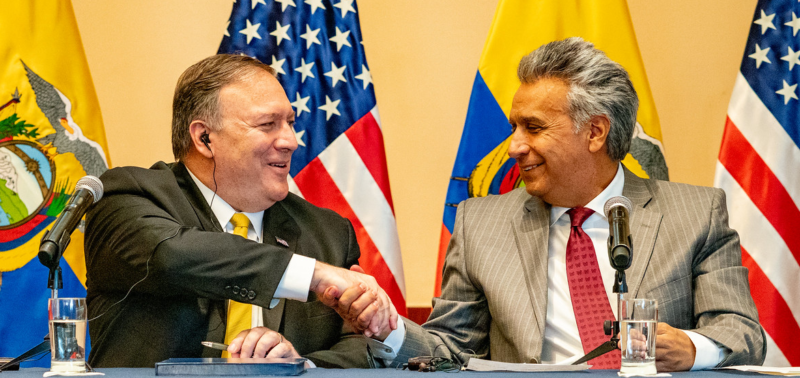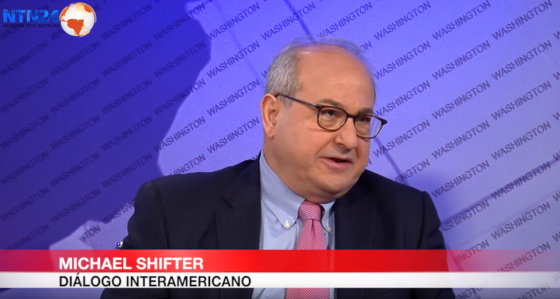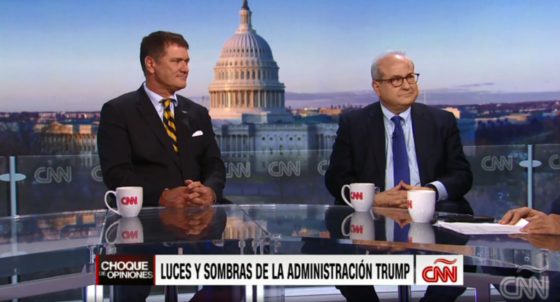A Decade of Change
Progress in Latin America has not been uniform and steady.
A Daily Publication of The Dialogue
U.S. Secretary of State Mike Pompeo visited Argentina, Ecuador, Mexico and El Salvador earlier this month on a trip aimed at addressing regional counterterrorism cooperation, the crisis in Venezuela and migration. Why did the U.S. administration select these four countries, and what were the visit’s main objectives? What did Pompeo achieve during the trip? How well is the Trump administration handling its relations with Latin American nations, and how else can Western Hemisphere countries cooperate in tackling the region’s most pressing challenges?
Rebecca Bill Chavez, nonresident senior fellow with the Peter D. Bell Rule of Law program at the Inter-American Dialogue: “Pompeo characterized his trip as part of a ‘concerted effort to re-engage with our partners.’ Absent a productive policy agenda and initiatives that resonate in the region, a visit by a member of an administration that routinely denigrates Latin America won’t lead to the engagement necessary to begin the arduous process of rebuilding the trust that has declined precipitously under Trump. The decision to stop in Ecuador, which has taken in more than 350,000 Venezuelans, was a sound one, given the potential to deepen bilateral ties under Lenín Moreno’s leadership. However, Pompeo missed the opportunity to demonstrate acceptance of shared regional responsibility by announcing TPS for Venezuelans. Instead, the administration expects Venezuela’s overburdened neighbors to host the four million refugees. Immigration was the focus in El Salvador and Mexico. Whether naive or disingenuous, Pompeo expressed confidence in El Salvador’s ability to control migration while he stands by Trump’s counterproductive decision to cut the U.S. assistance that had targeted the root causes: poverty, violence and poor governance. And after recognizing Mexico’s efforts to stem Central American migration, Pompeo should have taken ‘safe third country’ off the table.”
Aviva Chomsky, professor of history and coordinator of Latin American studies at Salem State University: “In Argentina, Pompeo took advantage of a counterterrorism forum marking the 25th anniversary of the 1994 bombing of a Jewish community center to solicit support for Trump’s bellicose policies against Iran. With European countries reluctant to join Trump’s crusade against Iran and the 2015 nuclear pact, the administration is turning to more compliant Latin America allies to try to create the illusion of international support for his position. In Mexico and El Salvador, the issue was immigration. Like Argentina and Ecuador, El Salvador is now governed by a right-leaning populist president eager for warm relations with the Trump administration. A fawning President Bukele assured Pompeo that ‘our relationship with the United States is the most important one we have in the world... [We are] willing to work 100 percent with the United States government and with the United States people.’ Mexico is a different story. The Trump administration has been exerting enormous pressure on Mexico’s leftist President López Obrador to prevent Central American migrants from reaching the United States. López Obrador has long called for humanitarian treatment of migrants, while Trump insists on a militarized approach. In June, Trump threatened massive tariff increases on Mexican goods if Mexico refused to increase militarization of its southern border, essentially outsourcing U.S. immigration enforcement. López Obrador caved and averted the tariff disaster. But U.S. threats have thus far failed to force Mexico to agree to pay for construction of the border wall or to compel U.S.-bound migrants to apply for asylum in Mexico.”
Ray Walser, retired foreign service officer and former Latin American policy analyst with The Heritage Foundation: “Secretary of State Pompeo’s four-day, four-country visit, albeit brief, appears to have been well organized and generally positive in outcomes. It again demonstrated that the Trump administration, at least at the cabinet level, recognizes the importance of investing face time with hemispheric leaders. In Buenos Aires, the secretary helped mark the 25th anniversary of the AMIA Jewish center bombing, attended a Western Hemisphere counterterrorism ministerial and saluted Argentina for designating Hezbollah a terrorist organization, the first Latin American nation to do so. Continued attention to international terrorism certainly fits the administration’s narrative regarding terrorist threats at a time of heightened tensions with Iran. In Ecuador, Pompeo helped solidify renewed bilateral ties in the post-Rafael Correa presidency of Lenín Moreno. The visit with El Salvador’s new, outside-the-box president, Nayib Bukele, a leader whose candor about accepting accountability and not blaming the ‘gringo’ for the migration crisis, promising to make El Salvador habitable again and disavowing a desire for ‘free money’ was music to the ears of the administration. The secretary also renewed the agreement to keep operating an important counternarcotics base at Comalapa. Pompeo’s meeting with Mexican Foreign Minister Marcelo Ebrard appeared to be cooperative in spirit and highlighted a notable reduction in border apprehensions of migrants. Nevertheless, long-term solutions remain elusive as Mexico seeks to protect its sovereignty and pride in an era of draconian efforts to stem the migrant flow, and while President Trump stirs the ‘send him/her back’ pot in the United States. Largely missing in reports of the Mexico City conversations: the ongoing implosion of Venezuela, particularly in light of the ‘neutrality’ of President López Obrador in the contest between Nicolás Maduro and Juan Guaidó.”
Peter DeShazo, visiting professor of Latin American, Latino and Caribbean Studies at Dartmouth College and former U.S. deputy assistant secretary of state for Western Hemisphere affairs: “Secretary Pompeo’s visit to the region had a positive tone, addressing important multilateral issues (counterterrorism, regional security, migration, Venezuela), as well as bilateral cooperation with all four countries visited. While public perception of the United States in Latin America (and Canada) has taken a strongly negative turn since the start of the Trump administration, the secretary’s visit underscored the importance of sustained diplomatic efforts in advancing U.S. interests in the region. Looking ahead, U.S. leadership should focus on several key objectives, starting with strengthening the North American trilateral relationship with Canada and Mexico, where a strategic approach aimed at deeper integration and cooperation based on mutual respect is essential. The U.S.-Mexico relationship is complex and should not be defined by the single issue of migration. The administration should enhance, not reduce, U.S. cooperation with Mexico across the board. U.S. leadership is essential in an international effort to support institutional reform and social and economic development in the Northern Triangle of Central America—addressing the migration problem at its root. This will require a policy and resource commitment from the United States well beyond what now exists. On Venezuela, the administration should work with democratic partners to broker a political solution to the impasse, avoiding counterproductive threats of military action. China and Cuba are important players on Venezuela, and a more creative diplomatic approach toward both would work better than strident criticism. Finally, the administration should provide more resources for U.S. diplomacy in the hemisphere.”
Nicolás Mariscal, member of the Advisor board and chairman of Grupo Marhnos in Mexico City: “Secretary of State Mike Pompeo visited Argentina, Ecuador, El Salvador and Mexico in a span of four days to expand cooperation on security issues; reinforce commitment to democracy, transparency and human rights; and to foster economic opportunities in those countries. Evidently, the trip had an underlying propeller: the migration crisis. President Donald Trump cut U.S. foreign aid to Guatemala, Honduras and El Salvador and in parallel asked them for cooperation to reduce immigration flows, which has increased diplomatic tension. Hence, a visit to countries such as Ecuador, where a U.S. secretary of state has not set foot in more than nine years, entails a desire for collaboration. The United States intends to address root causes that are compelling people to flee their countries. While the visit to Argentina focused primarily on counterterrorism, it still falls under the umbrella of security in Central and South America. Ecuador has received plenty of refugees and asylum seekers, becoming a key player in regional migration. Ecuador estimated that more than 600,000 Venezuelans entered the country last year. El Salvador and Mexico pose different challenges. Political changes in the former have led to instability and an increase in migrants. The latter has reduced the number of locals who flee and has become a serious transit problem for flows coming from Central America. The tariffs threat and bilateral tensions pushed Mexico to a more robust and strict migration policy, yielding a 28 percent decrease in the number of migrants encountered at the U.S.-Mexico border. President Trump has realized the importance of regional cooperation to address a regional problem. The dimensions of the problem transcend boundaries—therefore, so must the solutions.”
The Latin America Advisor features Q&A with leaders in politics, economics, and finance every business day. The publication is available to members of the Dialogue’s Corporate Program and others by subscription.
Progress in Latin America has not been uniform and steady.
En esta edición de Club de Prensa, Michael Shifter comenta sobre el despido de Rex Tillerson y nombramiento de Mike Pompeo, las acusaciones contra Alejandro Toledo, y las elecciones presidenciales en Colombia.
El 24 de marzo, Michael Shifter, presidente del Diálogo Interamericano, apareció en el programa de CNN Español Choque de Opiniones para ofrecer su perspectiva sobre que logrará el presidente estadounidense en la Cumbre de las Américas y el nombramiento del próximo secretario de estado, Mike Pompeo.
 Among the countries that U.S. Secretary of State Mike Pompeo visited on his four-country tour of Latin America this month was Ecuador, where he met with President Lenín Moreno. // Photo: U.S. State Department.
Among the countries that U.S. Secretary of State Mike Pompeo visited on his four-country tour of Latin America this month was Ecuador, where he met with President Lenín Moreno. // Photo: U.S. State Department.
 Video
Video
 Video
Video